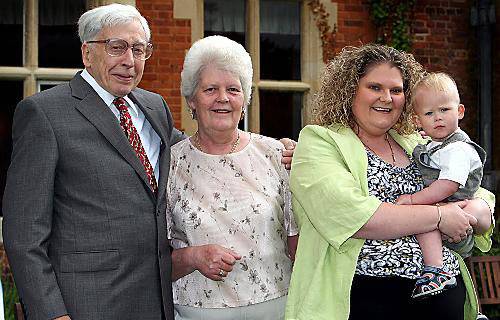Nobel Prize for test tube baby pioneer
Reporter: BEATRIZ AYALA and Press Association reporters
Date published: 05 October 2010

PROF Edwards is pictured in 2008 at the 30th anniversary celebration of the first test tube, Louise Brown. With him are Louise and her son Cameron and Louise’s mum, Lesley
TEST-tube baby pioneer Prof Robert Edwards, whose work led to the birth of Louise Brown in Oldham 32 years ago, was awarded the Nobel Prize in medicine yesterday.
Cambridge physiologist Prof Edwards (85) and Patrick Steptoe, a gynaecologic surgeon who died in 1998, developed IVF technology in which egg cells are fertilised outside the body and implanted in the womb.
The pair’s groundbreaking work led to the birth of the world’s first test-tube baby, Louise Brown, in 1978 at the then Oldham and District General Hospital, now the Royal Oldham Hospital.
Their work also gave thousands of infertile couples the chance to have children.
The medicine prize committee in Stockholm said in its citation: “His achievements have made it possible to treat infertility, a medical condition afflicting a large proportion of humanity including more than 10 per cent of all couples worldwide.
“Approximately four million individuals have been born thanks to IVF.
“Today, Robert Edwards’ vision is a reality and brings joy to infertile people all over the world.”
Prof Edwards and Mr Steptoe founded the first IVF clinic at Bourn Hall in Cambridge.
In a statement released before the Nobel announcement, Bourn Hall said one of Prof Edwards’ proudest moments was discovering that 1,000 IVF babies had been born at Bourn Hall since Louise Brown, and relaying that information to a seriously ill Dr Steptoe, shortly before his death in 1988.
The statement said Prof Edwards was “not well enough to give interviews”.
Mike Macnamee, chief executive of Bourn Hall, said: “Bob Edwards is one of our greatest scientists. His inspirational work in the early ‘Sixties led to a breakthrough that has enhanced the lives of millions of people worldwide.
“Bob Edwards is held in great affection by everyone that has worked with him and was treated by him.”
Dr Allan Pacey, senior lecturer in andrology (male reproduction) at the University of Sheffield, said: “This is excellent news, long long overdue.
“I think he could have been more highly honoured in this country, and I am delighted that the Nobel community have recognised his work. I am only sad that his failing health probably means he won’t be able fully to appreciate it.
“He revolutionised the treatment of infertility, and he did so at a time when people were against him, and he wasn’t really getting a lot of support.
“He shaped the profession long after he invented IVF — a great man, a big brain, a visionary.”
Dr Gillian Lockwood, medical director of Midland Fertility Services, said: “This is wonderful. He should have got it at least 20 years ago.
“It was always a source of concern and distress to the IVF community that someone they saw as an outstanding pioneer had not been sufficiently recognised.
“The award recognises not only his pioneering spirit but the strength of character that he and Steptoe had to show, because the medical community was very resistant to the idea of IVF.”
The medicine award was the first of the 2010 Nobel Prizes to be announced, with the winner receiving 10 million Swedish kronor (£940,000).
The prize for physics is announced today, chemistry tomorrow, literature on Thursday, the Nobel Peace Prize on Friday and economics on Monday.
Most Viewed News Stories
- 1You can score free tickets to a Latics game while supporting Dr Kershaw’s Hospice
- 2Primary school in Uppermill considers introducing new ‘faith-based’ entry criteria to tackle...
- 3Tributes paid following death of hugely respected Oldham community figure Dale Harris
- 4Public inquiry announced into rail upgrade that could leave villages ‘cut off’ for months
- 5Trio arrested, drugs and weapons seized following Chadderton raid




